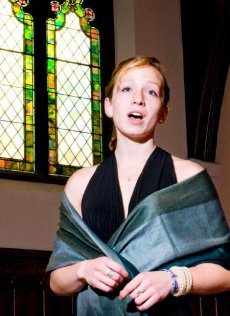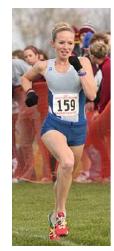
Photo by Daniel Milner
It would be easy to write three distinct profiles of graduating senior Esther Erb. One would depict her onstage in Harkness Chapel on a winter evening, completing her degree in early music performance with a vocal recital. Another would place her, in spring 2005, at the finish line of a 5,000-meter race, suddenly realizing that she had the makings of a long distance runner. And the third would show her in a classroom the summer after her freshman year, teaching English to non-native speakers, and asking herself questions about language acquisition that would lead her to pursue, along with music, a major in cognitive science.
In Erb's press clippings to date, her athletic gifts have received most of the attention. As a sophomore, she became the first woman from Case Western Reserve's cross country team to qualify for the National Collegiate Athletic Association nationals (Division III). Since then, she has earned All-American honors three times: twice in cross country, and once in the outdoor 5,000 meters. She also holds school records in all distance running events, from 1,500 to 10,000 meters.
Even as she developed into a leading college athlete, however, Erb was also maturing as a musician, following a course she had chosen long ago. In her native Virginia, Erb was a member of the Greater Richmond Children's Choir, an ensemble founded and conducted by her mother, Hope Armstrong Erb. While still in high school, Erb wrote to members of the acclaimed female choral group Anonymous 4, seeking advice about undergraduate early music programs, and they directed her to Ross Duffin, Fynette H. Kulas Professor of Music at Case Western Reserve.
Erb still remembers the day when she and her parents, on a college tour, stopped by Haydn Hall unannounced and found Duffin in his office. He was the only faculty member in the building just then, and precisely the one they were looking for. And Duffin, for his part, still remembers Erb's scholarship audition, which featured selections by Hildegard von Bingen and Bononcini.
"It's unusual," he says, "to find 18-year-olds who already know about early music, much less who have any experience in it. So here was someone who got our attention."
Erb won the scholarship and sang a solo that fall when the Collegium Musicum performed for the opening of Dukes and Angels, an exhibition of 15th-century Burgundian masterpieces at the Cleveland Museum of Art. Duffin calls the performance a baptism by fire: "Some of that music is extremely complex, so it was a real challenge. But she was thrown into the thick of it from her first semester."
Erb's emergence as a track star was far less predictable. She ran in middle school but did not join her high school team until she was a senior. (She'd spent her junior year abroad, in Germany—an experience that sparked her interest in learning and teaching languages.) When she arrived on campus for orientation, she was trying out a treadmill in Veale Center when coach Kathy Lanese noticed her, came over, and said, "You look like a runner." The team doctor was conducting physicals the same day. A few months later, after much hard training, Erb completed that 5,000-meter race, nearly matching a school record that she would ultimately break.
Finding the Parallel

Finding the Parallel Natural talent aside, Erb says that in order to reach her "apex"—whether as a singer or as a runner—she has to work as hard as anybody else. But her approaches to music and sport are otherwise distinct. "My teammates were talking to me after my recital," she says. "They're so used to seeing this intense runner, and they felt that I was much more relaxed as a singer. And it's true—I don't get nervous before performances like I do before races. You can't be an intense singer—but you need a certain amount of intensity to be a good runner.
"It's a separate personality, to some extent," Erb adds. Then she smiles. "But there's this underlying youngest child who just wants a lot of attention."
Before she gave her senior recital in Harkness Chapel, Erb performed it in Richmond and received a standing ovation. At that moment, she felt very much as she had the first time she'd won a cross country race by a landslide—no one behind her for another 20 seconds, the spectators clapping on both sides of the finish line like an audience in a concert hall. "I definitely found that parallel," Erb says. "I drew the connection immediately. And I thought: 'Oh, don't get too used to this, because you're going to come to expect it.'" Fortunately, that hasn't proved to be an unreasonable expectation.
Testing a Hypothesis
Although she entered cognitive science mainly to explore the relationship between mind and language, Erb devised a senior research project that combines her interests in music and sport. Like many runners in the iPod era, she listens to music (mostly emo and hip hop) as she trains. She believes that it distracts her from the pain and helps her to achieve her "optimal cadence."
Now, Erb is testing the hypothesis that runners who maintain that cadence perceive themselves as working less hard than they really are. This would be significant because, in sports, perceptions count. When runners give up in exhaustion, it's not because they have reached the actual limit of their endurance; human beings never press themselves that far. Rather, it's because they have reached the limit of their perceived endurance—what they feel capable of. If music helps reduce athletes' level of perceived exertion, then it enables them to do more than they could otherwise compel themselves to do.
For her research, Erb equips her subjects with iPods and compares their perceived exertion, as measured by survey responses, with data collected from heart monitors that they wear as they run. She will have analyzed the results by the time she graduates in May.
What then? In late April, Erb was awarded a Fulbright scholarship that will enable her to spend a year in Vienna, where she will teach English, study music, and continue to run. In the long term, she can imagine teaching in any number of fields, from music to English as a Second Language to special education.
As he looks back on his four years as Erb's teacher, advisor, and vocal director, what strikes Duffin most is that "she cares so deeply about whatever she's doing." He explains, "When she was in my 'Tuning and Temperament' class a year ago, she did a final project on just intonation in a gospel quartet piece. And I remember that she was so visibly moved by the musical accomplishment—hearing this piece that she knew well in a different way." He gives the impression that even three profiles wouldn't quite do her justice.
Related links:
